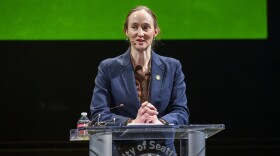After the Civil War, the Ku Klux Klan committed acts of domestic terror in the name of white supremacy in the South. That lasted just a few years before the federal government crushed the group.
But, half a century later, the Klan rose again, reaching new heights during the Roaring Twenties — the Jazz Age.
This second KKK, far larger and more widespread than the first, is the subject of Seattle author Timothy Egan’s new book A Fever in the Heartland.
Egan talked with KNKX's Will James about how millions of people in the U.S. came to embrace a terror group.
"Six million Americans put their hand on a Bible and put a hood over their head and swore an oath to, quote, 'forever uphold white supremacy," Egan said.
"Governors, including Oregon's, were elected with the full backing of the Klan. Four members of the United States Senate, up to 75 members of the House. So it wasn't some little bunch of guys in the basement."
Listen to their conversation above, or read selected quotes below.
Key Takeaways
On what fueled the KKK's resurgence:
The '20s was a time of tremendous change. First of all, it was peak of immigration that the Klansmen did not like. Jews from Eastern Europe. Italians from the South. And they were darker-skinned. They were strongly Catholic. They spoke a different language. They reacted to that. Third, the Great Migration. African-Americans were moving from the South to the North in great numbers, fleeing Jim Crow. So three great demographic movements. At the same time, one more thing: Women are socially liberated. They're much more visible and they're much less attached to their husbands. So a combination of immigration, African-American movement to the North, social liberation — all of that makes people think, "We've got to go back to an earlier day, a place where everyone was a white evangelical Protestant."
On D.C. Stephenson, the Grand Dragon of the Indiana Klan, who led KKK recruitment in the Midwest:
He's a classic American archetype: the con man, the drifter who rolls into town, the music man. He's well-spoken. He's charming. He's magnetic. He's charismatic. He says things that people want to hear. And within four years, he goes from this nobody who rolls into town — he really said, "I'm a nobody from nowhere" — to owning the state and owning much of the Midwest. He's in charge of 21 states in the North, where there is north of three million members of the Klan. It's a huge movement. He controls a United States senator. He single-handedly elects a governor. And he does it through classic con man sort of schemes. You know, he makes you feel good. He makes you feel like he plays to your fears, the fears that there's a changing America, that we've got to go back to the earlier age. And I saw him as sort of a metaphor for how so-called average Rockwellian Americans went down this path to hatred and intolerance.
On the writer Robert Coughlan, who watched his neighbors in Kokomo, Indiana, get swept up in the KKK:
He spent a long part of his life thinking about this: "How did my idyllic little town produce this?" And his psychological answer was there was a need to belong. But, also, there's a tedium in small town life. This gave order to the day. This gave your life a purpose. This gave your life shape. You were part of something bigger than yourself. He said one part of it was nativism. One part of it was moralistic puritanism. But he said there was also this need to belong to something greater than yourself, and the "greater than yourself" was the nation's oldest domestic terror group.
On how the KKK cloaked itself in patriotism, Christianity, and traditional American values:
Again, they were not a bunch of toothless rubes living in basements. They were people who held their communities together. They were coaches and teachers and ministers and merchants and bankers and judges. And they cloaked this whole thing in Rockwellian normalcy and called it Americanism. But here's the counter story. There were Jews in Hollywood doing Tin Pan Alley. There was a cultural explosion going on in the '20s of the Harlem renaissance. And jazz. The first African-American jazz record is recorded on the same day in Indiana that 40,000 people turn out for the biggest Klan rally. That's another Americanism. We give the world, this art form, jazz. We gave the world, essentially, popular culture through Hollywood. It's dominated mostly by people who the Klan says shouldn't be Americans. All these opponents finally got their act together enough to say, "This is Americanism." And to this day, we have that struggle. You know, what's the definition of Americanism?







